In celebration of National Women's Day, we share this conversation with Jane Evans. What can we do to support the next generation of women, and the one after them?
Having spent most of her life between Sydney and London, Jane Evans has run her own advertising businesses since 1995, with clients like Revlon, Maserati, and Guide Dogs, and in fields from technology to craft beer. She’s a writer, creative director, futurist, and advocate. She created Janee in response to the advertising industry’s lack of opportunity for highly experienced female creative talent; Janee is part advertising agency, part activist organisation, and part think tank, focused on communicating to and representation of the most powerful consumer group on the planet: women over 50.
Dr. Barb: Jane Evans is a woman with many interests and passions. She leads an agency that is part advertising, part activism, and part think tank. She herself is a writer and entrepreneur and a futurist. We came across a couple of her projects that really piqued our interest, so we reached out across the time zones to London and made the connection. Welcome, Jane.
Jane: Hi, how are you?
Dr. Barb: Good. Thanks for joining me today.
Jane: Oh, pleasure.
Dr. Barb: Your career has been largely focused in advertising and I've had the pleasure of speaking with a friend of yours, Cindy Gallop, and it sounds like both of you launched successful careers in advertising when women really weren't welcomed in the room yet.
Jane: Oh, very definitely not welcome in the room at all. We were quite a nuisance and also it was a time when Margaret Thatcher was the Prime Minister and that was every man's view of what a feminist was, which—neither Cindy Gallop nor I is anything like Margaret Thatcher.
Dr. Barb: Of course. Interesting. I guess I... That's an interesting perspective, but that probably did shape a lot of ideas about women, didn't it?
Jane: We were expected to go in and play a man's game. So, we were given absolutely no tolerance whatsoever for being female. It was like we had to be in there as big and as tough and as strong as they were.
Dr. Barb: So how have you seen the changes for women in terms of opportunity, collaborating, competing, and being heard? What's been your experience and observations?
Jane: Oh, look, the thing that I'm finding now is that people that are actually starting to realize a couple of things. They're realizing that feminism really is about making the world better for everybody and that it isn't a male and female thing, that it's actually you either want to dismantle the patriarchy or you want to profit from it. And there are as many women that want to profit from the patriarchy as there are men that want to dismantle it.
Dr. Barb: Interesting. So how do you see us successfully moving forward and accomplishing some of those things?
Jane: Look, I think the thing is, is that we all have to do our bit where we can. So I think we have to use our area of expertise and sort of do what we do best. So for instance, for me having come from an advertising background for many, many years, I want women to know, particularly women over the age of 50 that you're the most powerful consumer group on the planet. You buy 47 percent of everything. And it was like, in a world where we're seeing, like in the UK, women over 55 are the fastest growing group of suicides. In Australia they're the fastest growing group of homeless. And in America it's something like 56 percent of Americans will lose their job before retirement.
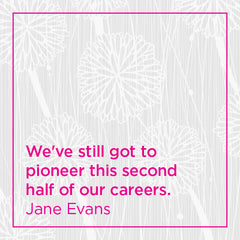
So we've actually got a real epidemic that we've got the first generation of women—and we're all going to live 20 years longer than our grandmothers, but nobody's actually designed this part of our careers. So the Uninvisibility Project is about letting people know that we're here, we're still here and we've actually still got to pioneer this second half of our careers.
Dr. Barb: So let's talk about that. So you have a website, interesting, incredible website on uninvisibility.com, and it talks about bringing midlife women into the spotlight. So I assume what you've just spoken about was your motivation to create this, but speak a little bit more about that.
Jane: Look, my motivation was three years of being completely and utterly ignored by my industry, even though they said they wanted to... The figures came out that 3 percent of the world's creative directors were female. Now, what's shocking about that is, is that ultimately the creative director is the person that decides what it goes on television or not. So, you know, there was a massive push that we've got to get more female creative directors, and within a few years we've got to up to, I think, 11 or 12 percent. So, I'd taken a break from the industry but was probably the most ridiculously qualified female creative director and was completely and utterly ignored by my industry and actually faced ageism head on. And it basically got to the point where I wondered whether there were actually any women over the age of 50 creating ads.
I put out a tweet on Twitter, I think it got retweeted 64 times and I got eight names. Four of those women would admit to being over 50 and went and had a cup of tea with me. And each of their stories were remarkable and I just went, "I know so many...." You know, I think the thing is, is once you become an invisible woman, you actually recognize all the women that are invisible. So I just went and found other women that were invisible and started telling their stories alongside women that absolutely, you know like Cindy, that absolutely no way on this planet could ever be invisible. So basically, because we're ignored by almost the whole of society, it was like nobody's actually got an image of who we are or what we can do. And you know, people go to the project and they see these women and they're like, "Wow, these women are incredible." But the really sad thing is is that half of those women are not making a living from their talents.
Dr. Barb: So what's the solution? What kind of actions can women take to try to become discovered, or what worked for you?
Jane: For me it was actually totally recognizing that I wasn't alone. And I think the biggest problem is, is when you become invisible you think you're the only one that's invisible. You know, I follow a lot of groups on Facebook and sort of daily there will be a woman in her 50s or 60s going, "I've just lost my job," or, "I'm going for an interview and will I get this job?" You know, and the world seems too completely oblivious to the fact that we are going to live 20 years longer than our grandmothers because they still think we are our grandmothers.
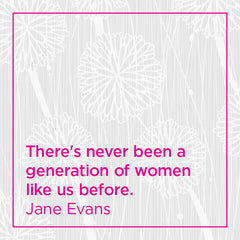 And it was like, you know, if you were going to live till 65 or 70, yeah, you were probably ready to start slowing down at 55, 60, 65, but when we're going to be living till 90 or 100 and we've been gifted with this extra life and the best bit is it's in the middle. It's like nobody's actually designed this part of our life. And so what the Uninvisibility Project is very much about is it's saying, please God, don't make kids design what this part of our life is. Let us design it, because we've been your age, but you've never been ours. And there's never been a generation of women like us before. We're the most educated women ever, we're the first group that came into the workforce en masse. We've got to define who we are and show who we are. And you know, we've all been in professions, particularly creative women suffer from ageism.
And it was like, you know, if you were going to live till 65 or 70, yeah, you were probably ready to start slowing down at 55, 60, 65, but when we're going to be living till 90 or 100 and we've been gifted with this extra life and the best bit is it's in the middle. It's like nobody's actually designed this part of our life. And so what the Uninvisibility Project is very much about is it's saying, please God, don't make kids design what this part of our life is. Let us design it, because we've been your age, but you've never been ours. And there's never been a generation of women like us before. We're the most educated women ever, we're the first group that came into the workforce en masse. We've got to define who we are and show who we are. And you know, we've all been in professions, particularly creative women suffer from ageism.
So let's get films made by midlife women, showing midlife women, telling midlife women stories. Let's get advertisers to not only want to take our money, but actually, seriously want to do something to promote us and actually show some respect for our consumer spending power.
Dr. Barb: So the solution, really, you think lies in other women networking to just bring women along?
Jane: We're the greatest networkers on the planet. Again, not only are we the most powerful consumer group on the planet, but we are also the greatest network on the planet because in the matriarchal role, and I mean that in a sort of allegorical way rather than we're all grandmothers or we're all a head of a tribe.
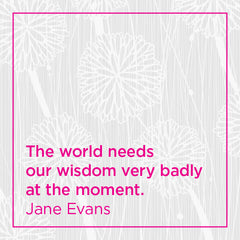
But you know, it's like we have cross-generational networks. And now with social media, we have cross-generational networks that span a very long time in our lives. So, on a personal level, we can do so much within our groups if we find our voice and we find our confidence and are comfortable in our wisdom because I think the world needs our wisdom very badly at the moment.
Dr. Barb: It does need our wisdom very badly. I think that's a wonderful point. I read a statement that you made that raising family gives women leadership, business, time management skills that cannot be surpassed and it just struck me of the complexity of what it does mean to be a wife and a mother and accomplish all the things that are required. And we just don't give credit to that.
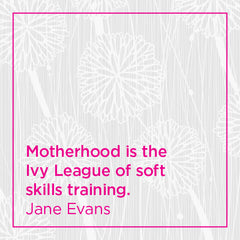
Jane: Look, I think that motherhood is the Ivy League of soft skills training and I think when a woman gets her kids to 18, raise them to adulthood, she should get a PhD. You know, it was like, I certainly know after having children the first thing is, is patience. And I think the world has lost a lot of patience. And it was like sometimes things take time, you know, but also, the greatest one is negotiation skills. If you can get a six-year-old to eat a piece of broccoli, you can get a client to do anything.
Dr. Barb: Touche. And you're currently working on a book?
Jane: Currently working on a book and a documentary, yes.
Dr. Barb: And is the documentary—
Jane: Just got the first draft back from the editor, so that's my weekend, actually, is going on to the second draft.
Dr. Barb: Wonderful. And it's about uninvisibility? Can you talk a little bit more about that? Is that what the topic—
Jane: It's basically called Uninvisible: The World Has Never Seen Women Like Us Before, and it's a manifesto for midlife women. It's going to be a very short read but it's going to pack a few punches.
Dr. Barb: Lovely. Can't wait. Do you have any expectation about when it might be ready to be published?
Jane: Seriously, let me see how I go on the rewrite. [laughs]
Dr. Barb: Okay.
Jane: As I said, the first draft's just come back from the editor so I've got to see all the notes and see how much of a rewrite it actually needs. And then as soon as we know the date that the ink is dry, we'll be starting the production process. But our hope is that we will get it out by International Women's Day next year. We started the project on International Women's Day so the date I'm working towards at the moment is International Women's Day 2020.
Dr. Barb: Great. I also read that you're described as a futurist, so can you talk a little bit about that work and how you came to it?
Jane: Look, what happens in advertising agencies, or it certainly did back in the early 90s, was they had their 2020 vision, which is quite ironic because I only actually can start to profit from what I saw back there now. [laughs] So you know, one of the great things about having a long career is, is you do actually have empirical evidence that in 1990 I saw this coming. And for instance, I was asked by a big drug company what people would do for headache, and I said that they'd be using acupuncture and naturopathy and things like that. And I got hauled into my managing director's office of, you know, "What drugs are you on, Jane? What's all this hippie shit you're giving to my drug company client?" But I always did wonder if he looks back on those meetings now going, "Oh, hold on a minute, people do use aromatherapy and acupuncture and natural things to solve headaches."
I was also involved with Kodak in around about the mid 90s when they were starting to come to terms with what digital would mean to their business. Basically I saw iPhones and iPads well before, probably 13 years before they arrived. But again, I was seen as a lunatic because it was it was like, "No, that's impossible."
Dr. Barb: Interesting.
Jane: But again, the great thing about having a career with time is that you can actually go back and go, "Look, I was seen as a lunatic when I did this commercial." I think the one I did for Kodak, my copywriter actually said to me, "Jane, that's the biggest load of crap you've ever produced."
Dr. Barb: But you probably immediately take that as an ultimate compliment.
Jane: Look, the thing is is like, who knows if I'm right. You were only going to know if you're right in 2020.
Dr. Barb: So what resources enable you to be the futurist and see the future? Can you identify that or it's just your way of synthesizing the present?
Jane: I'll tell you exactly how I do it. There's one thing that never, ever changes and that's human beings. So if somebody asks me, "Jane, what's the city going to look like in 10 years’ time?" I look at what tech is being developed and I look at human beings and I go, "Well that's pretty much the way I reckon it's going to go." So it appears to be guesswork, but then there's a bit of magic in it as well. You know, I'm a great believer in... and I have great connections with an elder in Australia. So I'm a great believer in the dream time. And I think there's things that can't be explained and I, me, this little person here with the experiences that one infinite is not even going to start to try and explain it.
Dr. Barb: So can you give any insight into what the major paths are that might define our future's going to look like, specifically for women?
Jane: Oh look, I think we're coming into a golden age of women.
Dr. Barb: Lovely.
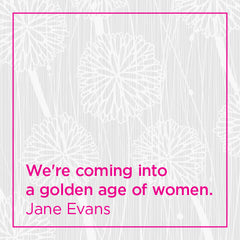 Jane: I think women are going to really come into their power. I think they're going to really come into their wisdom. I think men are going to start to understand that it's not a war. I mean, I look at the world at the moment and I just sort of see the patriarchy and its death throes. And sort of when a bear is put into a corner, it lashes out, and it just feels like that to me at the moment. I think there's been such a movement and there's so many amazing people on this planet making so many changes for all of us. You know, I can't help but see as though common sense has to prevail, wisdom has to prevail, and sometimes birth is painful. And I think maybe we're just having a few really painful contractions at the moment, but I believe what is coming is going to be absolutely incredible.
Jane: I think women are going to really come into their power. I think they're going to really come into their wisdom. I think men are going to start to understand that it's not a war. I mean, I look at the world at the moment and I just sort of see the patriarchy and its death throes. And sort of when a bear is put into a corner, it lashes out, and it just feels like that to me at the moment. I think there's been such a movement and there's so many amazing people on this planet making so many changes for all of us. You know, I can't help but see as though common sense has to prevail, wisdom has to prevail, and sometimes birth is painful. And I think maybe we're just having a few really painful contractions at the moment, but I believe what is coming is going to be absolutely incredible.
Dr. Barb: And when you talk about something like that, do you feel like that's going to transcend most cultures?
Jane: Oh yes, without a doubt. I think once technology gets to a point that it is available to a far greater amount of people around the world... I believe technology is going to make everybody's lives better. But I also think it's going to take out the inequality in the world. I think we've built a world on an analog system based on colonialism and I think that is what is dying at the moment. I think it's old energy versus new energy. And I'm looking forward to the new energy winning through because I don't think old energy can... We can't sustain old energy. We can't keep going the way that we are.
Dr. Barb: So along what you've just stated for women living longer and now stronger and having so much to offer the world, there's still a lot of women, I think, who sense there's something more for them at this midlife stage, but they just haven't discovered what it is. And I'm wondering, we often use the word reinvention and reinventing ourselves, is reinvention really part of it or is it more just continuing with the gift we have? It's just finding the platform in order to—
Jane: I've don't think it's reinvention: I think it's recalibration. And I think the mistake that a lot of people make is that they're thinking they have to completely reinvent themselves rather than... and it was like... I quite often look at myself as a startup and if something's not working, you pivot, you change, you move, but you don't go away entirely from the whole direction of your life.
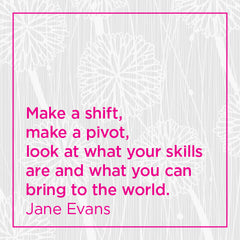 You know, one of the big mistakes that I see women make is that they leave their careers thinking that they're going to be the world's greatest business woman and they set up a fricking candle. You know? And it was like, throughout the world there's public garages full of kettles from women that have spent three years trying to build the business. Whereas, I think if they took, "Okay so I'm an accountant, I don't really want to be an accountant anymore," but sort of looked at what can I do with figures? What can I do... You know? It was like rather than doing a complete shift and going into something that they know absolutely nothing about because they feel as though they have to reinvent themselves. I think making a shift, making a pivot, looking at what your skills are and what you can bring to the world is a much better way of looking at it.
You know, one of the big mistakes that I see women make is that they leave their careers thinking that they're going to be the world's greatest business woman and they set up a fricking candle. You know? And it was like, throughout the world there's public garages full of kettles from women that have spent three years trying to build the business. Whereas, I think if they took, "Okay so I'm an accountant, I don't really want to be an accountant anymore," but sort of looked at what can I do with figures? What can I do... You know? It was like rather than doing a complete shift and going into something that they know absolutely nothing about because they feel as though they have to reinvent themselves. I think making a shift, making a pivot, looking at what your skills are and what you can bring to the world is a much better way of looking at it.
Dr. Barb: And do you have any resources that could direct women to the discovery process for that? Are there books or online or networks of women who help others discover that?
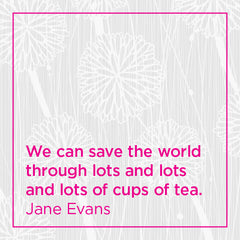 Jane: Oh look, the way I've done it has been through lots and lots and lots of cups of tea. And I think that we can actually save the world through lots and lots and lots of cups of tea. So if you are at the stage in your life where you don't know where you are or what you're doing, or you've just lost your job or you're afraid for your career, or you're the only older woman in your job and your spending every day terrified that somebody's going to call you in an office and fire you on Friday, to start looking at your network and actually putting yourself out there a bit. And you don't have to go out with answers. Lots of people want to give their advice.
Jane: Oh look, the way I've done it has been through lots and lots and lots of cups of tea. And I think that we can actually save the world through lots and lots and lots of cups of tea. So if you are at the stage in your life where you don't know where you are or what you're doing, or you've just lost your job or you're afraid for your career, or you're the only older woman in your job and your spending every day terrified that somebody's going to call you in an office and fire you on Friday, to start looking at your network and actually putting yourself out there a bit. And you don't have to go out with answers. Lots of people want to give their advice.
So for instance, if you've been that accountant, why don't you go and find other women that were accountants in other firms? It's like, you're probably connected on LinkedIn and just say, "Can we go and have a cup of coffee?" Then you'll probably find that they're probably facing the same things, too, and they've probably found somebody else that's got the same problem as well. This is how cool startups start up, is by people sectioning off, finding other people of the same interests that are maybe suffering the same frustrations. And go find the person that you've always admired in your industry and ask them for help, ask them for advice.
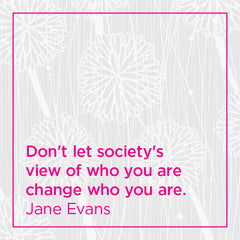 I think the thing is, is don't let ageism and don't let the society's view of who you are change who you are. You wouldn't have gotten this far in life without being a brilliant human being in some areas and an absolutely hopeless human being in others. And it was like, you know, recognize your strengths and go find the people that can help you find where you want to go. And then when you do know where you want to go, find the people that can help you do it. But seriously, lots and lots of cups of tea. Just going in and pick people's brains.
I think the thing is, is don't let ageism and don't let the society's view of who you are change who you are. You wouldn't have gotten this far in life without being a brilliant human being in some areas and an absolutely hopeless human being in others. And it was like, you know, recognize your strengths and go find the people that can help you find where you want to go. And then when you do know where you want to go, find the people that can help you do it. But seriously, lots and lots of cups of tea. Just going in and pick people's brains.
Dr. Barb: Yeah. So I've read that you believe optimism is the key to the future. And I think you just touched on that by what you said, but what are some practical ways to foster optimism?
Jane: Absolute certainty, like being absolutely certain that everything is going to be all right. Even at those moments when it's going, "Oh this is really awful," is always... And I don't say ignore that. So for instance, when I was going through major problems, I'd allow myself one hour a day to concentrate on the problem so I could get the tax bill sorted or ring the landlady or, you know, all of those sorts of things. But I wasn't allowed to worry about anything or take another phone call about any of that rubbish until the same time the next day, which left me the rest of the day to be optimistic.
Dr. Barb: So it was really intention and practice or that that can lead to some success and fostering optimism.
Jane: Look, you can't Pollyanna your way through things. When you're in the middle of something, you can't just say, "Oh, it'll be all right. Everything will turn out all right." That's a recipe for disaster. It will turn into a disaster if that's your attitude, but if you go, "Okay, I'm only going to allot the amount of time and energy that I absolutely—the bare minimum I need to make sure that this situation doesn't get any worse. I'm going to spend an hour a day, or a day a week, or whatever, on the problem, but the rest of the time I'm going to spend working on how to get out of this. What I'm going to be building, what I'm going to be creating." And again, I think if we all did that a bit more, if we actually went, "You know what, I'm only going to allow 10 minutes a day for drama. Rest of the times a day I'm going to be calm."
Dr. Barb: You know, I'm thinking of someone right now who's going through a difficult time and really all consumed by it, but this idea of conserving time and energy, devoting it into the problem and then back to working and back to solution and back to real life seems like a really practical approach to it. I can't wait to share that.
Jane: And it also gives you permission to let it go.
Dr. Barb: Yes.
Jane: Because what happens is I would do mine in the morning and at 10—it was between 9 a.m. and 10 a.m. I was like talking to the bank man, but then the moment 10 came, I'd get my dog, and go for a walk and I'd actually go, "All right, I'm allowed to now release that because I've dealt with it." And I think when you're suffering from problems, a lot of it is actually just not dealing with it. And it was like, if you just deal with it, it's actually not as... I had one thing that I was like, "Oh, I don't want to do this, I don't want to do this." I then got online and basically they said, "Have there been any changes since last year?" I went, "Oh, no." And that was all I had to do. Now I could've spent a week worrying about going and filling in this form.
Dr. Barb: Interesting. Uh-huh.
Jane: So yeah.
Dr. Barb: So, on a little different note, I'm in West Michigan and we have a reputation for being a craft beer capital, and I understand that you have had an interest in craft beer yourself. So tell us a little bit about your craft beer experience.
Jane: Oh, look, it's actually really quite interesting that one of the first things I ever worked on in advertising was beer. But for some reason when I went to Australia, girls were not allowed to work on beer until—In fact, when I started up my own agency and I was freelancing, we got a brief to come up with a new premium beer brand. And I was working with a group of great strategists and we found Australia's first brewer, who was this incredible guy called James Squire, who had this amazing story. So I designed the brand, created all the bottles, and it's now the biggest craft beer in Australia.
Dr. Barb: Wow. Congratulations.
Jane: Yeah, and it's great. And the funny thing was when I did all the work I was actually pregnant with my first daughter and they didn't realize for 18 months that I didn't actually drink beer. [laughs] By the time they realized, they didn't care because it was such a success. But they did say, "If we'd known you didn't drink," you know, it was like, "We gave the account to you as a woman but if we'd known you didn't drink beer..."
Dr. Barb: So as we conclude our time together, I like to ask women, where do you personally find fullness at this stage of your life?
Jane: Look, my youngest daughter turned 18 last week. So currently at the moment I'm getting a tremendous amount of satisfaction from the fact that I actually didn't kill them.
Dr. Barb: I'm happy for them and I'm happy for you. [laughs]
Jane: But yeah, I think it—I find it really interesting, it's like men get so much of their identity out of their work and women get so much identity out of being a mother. And I'm really quite taken aback at just how much pride I have in the fact that I've raised two incredible, incredible daughters. It means a tremendous amount and also gives me a tremendous amount of confidence because if they were a product that I was bringing to market, I think I've done pretty well.
Dr. Barb: And I can relate to that as the mother of three daughters. So it is—I think when we talk about ourselves and when we're getting acquainted... I was with a group last night and we were introducing ourselves and I did find it interesting, and it was a mentoring relationships that were being discussed, most the women shared things personal about their family and most of the men their points of interests were professional. And I sat in the room thinking, "Yeah, we're wired differently and we identify ourselves very differently."
Jane: Which is why if we're going to be in the workforce, then we have to be allowed to be proud of being mothers, not feeling ashamed of it.
Dr. Barb: Right.
Jane: And I think there's still a tremendous amount of shame about being mothers. But also the other thing is, is we've got to expand our career. It's so cruel that the sweet spot in a career is 35. So women are facing the biological clock and the career doomsday clock at exactly the same time. Now, if we extend the career sweet spot to 55, 60, it gives everybody a chance to have a go.
Dr. Barb: Oh, that is so true. That is so true. And I think as we've talked here today, it feels like there's some energy and motion maybe in that direction. And for our daughters, maybe we can be optimistic that that will be their reality.
Jane: Oh look, if you see—I mean, the generation that's coming up, particularly my younger daughter’s, I mean, they're incredible. I don't know what the hell they call them, Gen Z or I don't know, the Indigos or the Crystals or whatever they are. They're amazing. I mean, they're an incredible group of kids and it was like, we've got to make sure that the world is ready for them because they're going to do amazing things.
Dr. Barb: Yeah. Well, thank you for your time today, Jane. It was great speaking with you.
Jane: Pleasure.
 Dr. Barb DePree, M.D., has been a gynecologist and women’s health provider for almost 30 years and a menopause care specialist for the past ten.
Dr. Barb DePree, M.D., has been a gynecologist and women’s health provider for almost 30 years and a menopause care specialist for the past ten.


0 comments